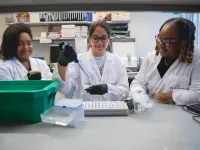(Press-News.org) Faculty members in the Department of Emergency Medicine at the University of Colorado School of Medicine have been awarded $5 million by the U.S. Department of Defense to work with partners in Ukraine on clinical and logistical challenges associated with modern large-scale combat operations and prolonged casualty care.
The overarching program — Research and Scalable Infrastructure to Improve Outcomes on the Front Lines of Ukraine by Advancing Treatment and Evaluation (RESOLUTE) — is focusing on collecting data related to antibiotic-resistant wound infections, which have substantially increased amid the military conflict.
The initial project — called the Antimicrobial Resistance Research to Improve Outcomes of Traumatic Wounds study (ARROW) — will enable future clinical trials, testing solutions that help prevent and treat wound infections and related complications.
“Ukrainians are under tremendous strain right now, so most resources and personnel have been dedicated to defending the country and providing basic medical care to injured civilians and soldiers,” says Adit Ginde, MD, MPH, professor of emergency medicine and principal investigator of the project.
Ginde worked with the CU Center for Combat Medicine and Battlefield (COMBAT) Research team to secure the research award. Corey Bills, MD, associate professor of emergency medicine, is co-lead investigator for the project.
“The ability to complete this work is important for Ukraine because it is a major issue that they have not yet been able to tackle. It also gives the U.S. military the opportunity to study war injuries during large-scale combat,” says Ginde, who also serves as principal investigator of the Airway, Trauma, Lung Injury, and Sepsis (ATLAS) research program.
Solving immediate data gaps
The conflict in Ukraine has revealed extraordinarily high rates of multidrug-resistant organisms (MRDOs), which can be difficult to treat and frequently lead to complications such as sepsis, amputations, and sometimes death.
Roman Fishchuk, MD, a clinical research leader at Central City Clinical Hospital of Ivano-Frankivsk in western Ukraine, will lead in-country efforts to collect data at three front-line hospitals and two referral centers in western Ukraine implement the study.
Wound infections resulting from trauma are among the most common contributors to illness and death among combatants and civilians in war and conflict, and MDROs have reached very high rates in Ukraine.
Currently, no systematic data collection for wound infection exists in Ukraine, so creating scalable infrastructure for that purpose is an urgent need. A key problem, Fishchuk says, is the absence of electronic health records. Some hospitals and clinics rely on hand-written documents, which cannot be used for data analysis.
“It’s not a one-day or one-person fix,” Fishchuk says. “With so many other problems in a war zone that must be solved quickly, we need RESOLUTE and ARROW so that we can make conclusions from the data that will improve patient care and outcomes.”
Fishchuk’s team will collect data and specimens over the next two years at five sites in Ukraine. The project initially will enroll up to 1,000 patients and collect data including injury and wound characteristics, molecular testing, and clinical outcomes.
“Wound infection is consistently identified as a top concern in Ukraine and the U.S. military, which is why we are moving forward on this project first,” Ginde says. “The first step is actually describing the problem in a more systematic way and then quickly pivot to clinical trials.”
Foundations for future research
The RESOLUTE program is designed to expand to include other clinical and logistical challenges, including psychological health and resuscitation, that are associated with modern large-scale combat operations. It creates paths for additional research projects and for initiating clinical trials.
“Our plan is to collect important data on wound infection, but also to create a scalable infrastructure so that we can address other areas,” Ginde says. “We have requests from government, academic, and industry partners who have solutions but not the on-the-ground presence or infrastructure that we are building. Our work in Ukraine will help us expand the program.”
“I'm grateful to our colleagues at the University of Colorado for being brave, working with us, and being so proactive. After the full-scale invasion started, most of the companies we used to work with clinical trials on stopped working in Ukraine,” Fishchuk says. “This partnership is inspiring and helps us do our job and think about research in new ways. Dr. Ginde and his team are visionaries, and they understand that this research will help patients in Ukraine and globally.”
This effort was funded under MTEC solicitation MTEC-24-01-MPAI and is funded by Combat Casualty Research Program (CCCRP) under the Department of Defense. The views and conclusions contained herein are those of the authors and should not be interpreted as necessarily representing the official policies or endorsements, either expressed or implied, of the U.S. Government.
END
DOD grants CU researchers $5 Million to study antibiotic-resistant wound infections in Ukraine
A new project funded by the U.S. Department of Defense partners emergency medicine faculty with research clinicians in Ukraine to launch a research platform for studying war-related wound infections and inform future clinical trials
2024-08-22
ELSE PRESS RELEASES FROM THIS DATE:
3D body volume scanner uses AI to help predict metabolic syndrome risk
2024-08-22
ROCHESTER, Minn. — Mayo Clinic researchers are using artificial intelligence (AI) with an advanced 3D body-volume scanner – originally developed for the clothing industry – to help doctors predict metabolic syndrome risk and severity. The combination of tools offers doctors a more precise alternative to other measures of disease risk like body mass index (BMI) and waist-to-hip ratio, according to findings published in the European Heart Journal - Digital Health.
Metabolic syndrome can lead to heart attack, stroke and other serious health issues and affects over a third of the U.S. population and a quarter of people globally. ...
Building a COMPASS to navigate future pandemics
2024-08-22
Viruses like SARS-CoV-2 don’t respect boundaries, moving between species and continents and leaving destruction as they go. Beating the next pathogen with pandemic potential means getting good at crossing borders ourselves — between fields of study, between research universities, and between scientists and the wider community.
An $18 million grant announced by the U.S. National Science Foundation (NSF) will put that goal within reach. The award brings together five universities and more than 20 researchers, academics, and public health experts to establish the Virginia Tech-led Center ...
Macrophage mix helps determine rate and fate of fatty liver disease
2024-08-22
Formerly known as nonalcoholic steatohepatitis, metabolic dysfunction-associated steatohepatitis (MASH) is an inflammatory disease characterized by liver scarring or fibrosis that progressively impairs liver function.
It is a major risk factor for cirrhosis and liver cancer. And because treatment options are limited, MASH is the second leading cause for liver transplants in the United States after cirrhosis caused by chronic hepatitis C infection.
A better understanding of the pathological processes that drive MASH is critical to creating effective treatments. In a new paper published ...
Department of Energy announces $36 million to support energy-relevant research in underrepresented regions of America
2024-08-22
WASHINGTON, D.C. - Ensuring that scientific funding goes to states and territories that have typically received smaller fractions of federal research dollars in the past, the Department of Energy (DOE) today announced $36 million in funding for 39 research projects in 19 states via the Established Program to Stimulate Competitive Research (EPSCoR). The grants connect innovative ideas from scientists at eligible institutions with leading-edge capabilities at the DOE national laboratories.
Supporting scientists while building the expertise and capabilities critical for performing leading research ...
Analysis of 1,500 climate policies reveals only a small fraction achieved significant emission reductions
2024-08-22
A new machine learning analysis has revealed the most effective climate policies out of 1,500 implemented worldwide over the last two decades. Some of the success stories – numbered at about 63 – involve rarely studied policies and unappreciated policy combinations. “Our results provide a clear yet sobering perspective on the policy effort necessary for closing the remaining emissions gap of 23 billion tons carbon dioxide (CO2) by 2023,” write the authors. To achieve the Paris Agreement’s climate targets, it is essential to know which ...
Fatty-acid derived polymers yield recyclable and highly versatile adhesives
2024-08-22
Researchers have presented a new family of polymer adhesives that offer a sustainable and recyclable alternative to conventional polymer adhesives and can be used across a wide range of applications, from industrial adhesives to surgical superglues. The new chemical approach to aLA polymerization addresses the performance and environmental challenges of traditional polymers, providing environmentally friendly adhesive solutions. Polymer adhesives are ubiquitous in modern life and are widely used in many medical, consumer, and industrial products. Given this diversity, each adhesive material is often tailored ...
Governance needed to ensure biosecurity of biological AI models
2024-08-22
Concerns over the biosecurity risks posed by artificial intelligence (AI) models in biology continue to grow. Amid this concern, Doni Bloomfield and colleagues argue, in a Policy Forum, for improved governance and pre-release safety evaluations of new models in order to mitigate potential threats. “We propose that national governments, including the United States, pass legislation and set mandatory rules that will prevent advanced biological models from substantially contributing to large-scale dangers, such as the creation of novel or enhanced pathogens ...
Spontaneous transfer of mitochondrial DNA into the nuclear genomes in the human brain over the individual’s lifespan
2024-08-22
Somatic nuclear mitochondrial DNA (Numt) insertions are mito-nuclear gene transfer events that can arise in the germline and in cancer. This study shows that Numt insertions arise spontaneously and accumulate in brain tissues during development or over the human lifespan.
#####
In your coverage, please use this URL to provide access to the freely available paper in PLOS Biology: http://journals.plos.org/plosbiology/article?id=10.1371/journal.pbio.3002723
Article Title: Somatic nuclear mitochondrial DNA insertions are prevalent in the human brain and accumulate over time in fibroblasts
Author Countries: United States
Funding: see manuscript END ...
Cancer drug could treat early-stage Alzheimer’s disease, study shows
2024-08-22
UNIVERSITY PARK, Pa. — A type of drug developed for treating cancer holds promise as a new treatment for neurodegenerative diseases such as Alzheimer’s, according to a recent study by researchers at Penn State, Stanford University and an international team of collaborators.
The researchers discovered that by blocking a specific enzyme called indoleamine-2,3-dioxygenase 1, or IDO1 for short, they could rescue memory and brain function in models that mimic Alzheimer’s disease. The findings, published today (Aug. 22) in the journal Science, suggest that IDO1 inhibitors currently ...
Drugs that improve brain metabolism could help Alzheimer’s patients
2024-08-22
Among the many ways neuroscientists think Alzheimer’s disease may strip away brain function is by disrupting the glucose metabolism needed to fuel the healthy brain. In essence, declining metabolism robs the brain of energy, impairing thinking and memory.
Against that backdrop, a team of neuroscientists at the Knight Initiative for Brain Resilience at Stanford’s Wu Tsai Neurosciences Institute have zeroed in on a critical regulator of brain metabolism known as the kynurenine pathway. They hypothesize that that the kynurenine pathway is overactivated as a result of ...
LAST 30 PRESS RELEASES:
University of Miami business technology department ranked No. 1 in the nation for research productivity
Researchers build ultra-efficient optical sensors shrinking light to a chip
Why laws named after tragedies win public support
Missing geomagnetic reversals in the geomagnetic reversal history
EPA criminal sanctions align with a county’s wealth, not pollution
“Instead of humans, robots”: fully automated catalyst testing technology developed
Lehigh and Rice universities partner with global industry leaders to revolutionize catastrophe modeling
Engineers sharpen gene-editing tools to target cystic fibrosis
Pets can help older adults’ health & well-being, but may strain budgets too
First evidence of WHO ‘critical priority’ fungal pathogen becoming more deadly when co-infected with tuberculosis
World-first safety guide for public use of AI health chatbots
Women may face heart attack risk with a lower plaque level than men
Proximity to nuclear power plants associated with increased cancer mortality
Women’s risk of major cardiac events emerges at lower coronary plaque burden compared to men
Peatland lakes in the Congo Basin release carbon that is thousands of years old
Breadcrumbs lead to fossil free production of everyday goods
New computation method for climate extremes: Researchers at the University of Graz reveal tenfold increase of heat over Europe
Does mental health affect mortality risk in adults with cancer?
EANM launches new award to accelerate alpha radioligand therapy research
Globe-trotting ancient ‘sea-salamander’ fossils rediscovered from Australia’s dawn of the Age of Dinosaurs
Roadmap for Europe’s biodiversity monitoring system
Novel camel antimicrobial peptides show promise against drug-resistant bacteria
Scientists discover why we know when to stop scratching an itch
A hidden reason inner ear cells die – and what it means for preventing hearing loss
Researchers discover how tuberculosis bacteria use a “stealth” mechanism to evade the immune system
New microscopy technique lets scientists see cells in unprecedented detail and color
Sometimes less is more: Scientists rethink how to pack medicine into tiny delivery capsules
Scientists build low-cost microscope to study living cells in zero gravity
The Biophysical Journal names Denis V. Titov the 2025 Paper of the Year-Early Career Investigator awardee
Scientists show how your body senses cold—and why menthol feels cool
[Press-News.org] DOD grants CU researchers $5 Million to study antibiotic-resistant wound infections in UkraineA new project funded by the U.S. Department of Defense partners emergency medicine faculty with research clinicians in Ukraine to launch a research platform for studying war-related wound infections and inform future clinical trials



